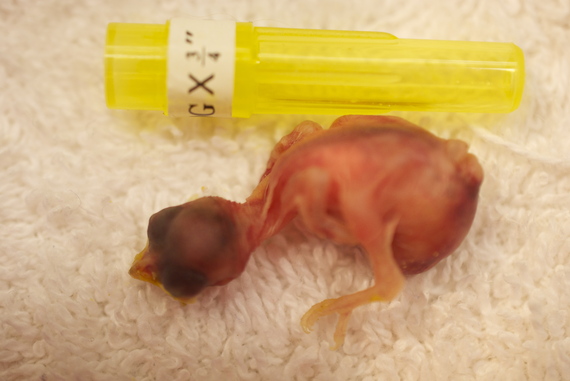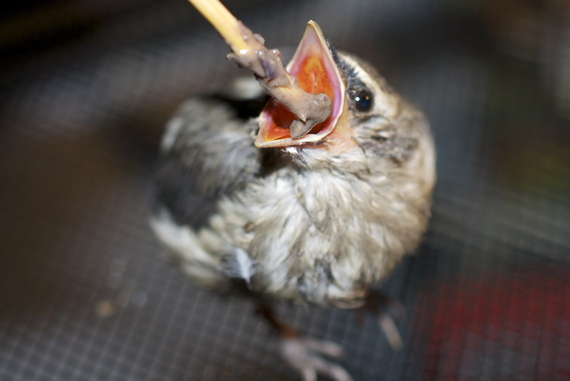Here in Ontario, songbird eggs will start to hatch soon. For us, that means calls from people who have found a baby bird who has fallen from the nest.
Baby songbirds are very delicate and require the constant care of a parent. Most songbird parents lack the appropriate body parts to be able to pick up their fallen offspring and return them to the nest.
The big myth I want to debunk is that songbird parents will reject their young just because a human touched them and this is not true.
It is perfectly okay for a person to pick up the fallen young and return it to the nest if it is within human reach.
I still recommend that you use gloves for your own safety and I would like to add to this that I do not advocate baby wildlife being handled willy-nilly, but when needed you can touch a baby bird without it being rejected by its parents.
If you can't reach the nest or if the nest was destroyed for whatever reason, you can use something like a small margarine container (with holes in the bottom so it can't fill up with water) lined with paper towel and hang it as near as you can get to the original nest site. Some metal wire can be helpful in securing it.
Now make sure that the area is as quiet as possible without human/pet presence to allow the parents to come back and adjust to the change.
At Hobbitstee, when we get healthy songbird babies in who have been orphaned for some reason we often look for surrogate parents. Many, but not all species of songbird, will readily care for a hatchling of the same species that is not their own.
We do this to allow the young to grow up like a normal songbird. No matter how hard we try as humans we make poor substitute wildlife parents.
When we get hatchlings or nestlings in who are injured or we can't foster with other birds we will raise them. This is a very delicate and time-consuming undertaking. The feeding schedule for many baby birds is every half hour during daylight hours. There is also a huge variance in diets between species of songbirds and we work very hard to mimic their natural diets as much as we can so that they can grow up healthy.
One of the things that happen often later in the season is that people see fledglings and assume them to be orphaned. Fledglings are almost if not fully feathered and have left the nest to learn how to fly. The bird parents continue to care for the fledglings and if you watch (from a non-invasive distance) you can see the parents fly off and on with food.
It is therefor important to differentiate between baby birds who do and ones that don't need your help. If the baby bird is almost fully feathered and is not injured it is likely a fledgling.
If you see a baby bird with little to no feathers out of the nest it does likely need help to either get returned to the nest if at all possible or to a rehab facility.
One of the common mistakes people make is to syringe water directly into the bird's mouth. This can cause the bird to aspirate. Baby bird hatchlings actually don't drink water. They get their fluids from the food they are fed.
Choosing the right diet for the right bird is important. Feeding a seed-based diet to an insectivore as an example usually ends up killing the bird.
Determining what type of baby bird you are looking at can get really complicated when they don't have feathers yet. Luckily at Hobbitstee, we have some songbird identification experts on speed dial we call when we get stumped. It is important to get a correct identification so we know we are feeding an appropriate diet.
We also need to ensure that the hatchlings learn to be birds and learn appropriate bird and species-specific behavior. Imprinting on humans does not help the birds live a happy, free bird life.
In Canada, all the migratory birds are protected under Migratory Bird Conservation Act; and in Ontario, most non-migratory birds under the Fish and Wildlife Act, meaning that without the appropriate permits it is a violation to be in possession of either.
Due to the time-sensitive nature of baby birds, it is appreciated that you get in touch with a wildlife rehabilitator as soon as you can, and if at all possible help with transporting if need be.


